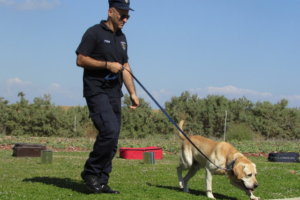
Whether it’s sniffing out evidence or chasing down bad guys, working K9s are an important part of police forces all around the globe. These dogs undergo intense training, are made to pass important tests, and go to work everyday alongside their handlers. You’ll find several different breeds wearing official police vests, but the best dogs on the force always have specific characteristics in common. To be a successful police dog, they need to be intelligent, focused, and determined. As it turns out, gender might have something to do with it as well. But it’s probably not what you think.
Global News reports the Ontario Provincial Police have 27 police dogs, but only one of those is female. At the same time, female dogs make up only 15% of the current working dogs in Alberta, Canada. The trend isn’t surprising. In Canada and the United States, the majority of dogs working for police are male. It’s not something the average person would notice, but the reasoning behind it tells us a lot about how female and male dogs are different.
The one characteristic that seems to be holding female dogs back, is their maternal, protective instinct. Sgt. Chris Browne of the Royal Canadian Mounted Police says female dogs typically want to stay close to their handlers. They’re more reluctant than their male counterparts to go out on their own to apprehend a suspect or search for evidence. They’re also generally less aggressive. He told Global News,
“A male dog has no problem leaving the handler to go and apprehend someone, or to go and do a search in a large open area without feeling the need to go back to the handler.”
As programs progress, however, trainers are learning more ways to turn female dogs into great police dogs. They’re focusing on encouraging the dogs to leave their handlers, and there are signs their efforts are working. The number of female dogs being both trained and assigned to police handlers has increased over the past 10 years. Once the issue of independence is resolved, many handlers say female dogs out perform males with the same training. Browne said,
“I find that our female dogs are far more meticulous trackers—they are much better searchers and they have a far more balanced temperament.”
(function(d, s, id) { var js, fjs = d.getElementsByTagName(s)[0]; if (d.getElementById(id)) return; js = d.createElement(s); js.id = id; js.src = ‘https://connect.facebook.net/en_US/sdk.js#xfbml=1&version=v3.2’; fjs.parentNode.insertBefore(js, fjs);}(document, ‘script’, ‘facebook-jssdk’));
Posted by Royal Canadian Mounted Police on Wednesday, May 23, 2018
While male dogs are known for somewhat challenging personalities, females are lauded for the fast and true bonds they form with their handlers. Constable Chad Scheske of the Royal Canadian Mounted Police has been working with his assigned K9, Siren, for the past three years. Siren is one of the few female police dogs in Canada, and she’s involved in almost all aspects of Scheske’s police work. They have a strong bond, and Siren is an important part of the team.
While Siren was bred through the RCMP, trained, and assigned to a police force, many female dogs that show similar attributes are never given their official K9 vests. Even when they’re naturally good at their jobs, female dogs in police force breeding programs are often held back from professional work for breeding purposes. They’re used to create a continued lineage of successful police dogs, and it’s part of the reason why you aren’t likely to come across a female police dog in your hometown.
With continued advancement in training techniques, however, female police dogs are expected to become more common. Working in a professional capacity is no easy feat for any dog, but there are certain dogs that stand out. At the end of the day, it’s about how a dog responds to training and interacts with their handler. Male or female, German Shepherd or pit bull, police dogs will always play vital roles in protecting communities.
h/t: Global News
The post Is There A Reason You See More Male Police Dogs Than Female? appeared first on iHeartDogs.com.
Be the first to comment